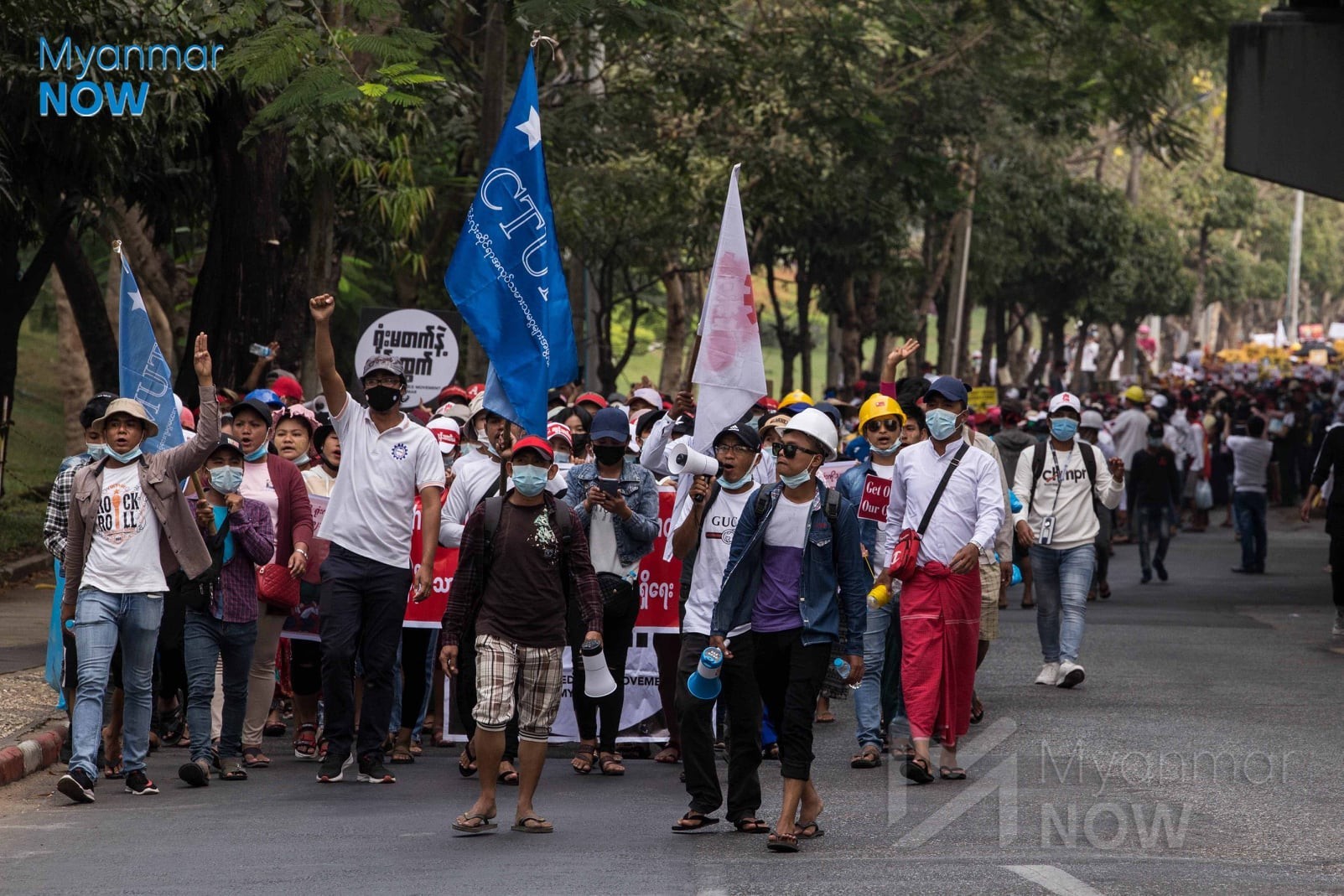
Four international clothing companies have announced that they will no longer be sourcing their products from Myanmar’s garment factories, citing ongoing rights violations perpetrated against workers.
Dutch-owned C&A, Ireland’s Primark, and UK-based Tesco PLC and Marks & Spencer recently moved to cease operations in the country, more than 18 months after the February 2021 military coup.
Chair of the Industry Workers’ Federation of Myanmar (IWFM) Khaing Zar Aung—who is also a central executive committee member of the Confederation of Trade Unions Myanmar (CTUM)—said that it had become impossible for manufacturers to operate in accordance with international working standards under the junta.
“The brands that decided to leave are simply facing the reality of the working conditions in the country. The brands that are deciding to stay will just be putting on a facade,” she said.
Some 16 labour organisations have been banned by the junta since the coup, and members and leaders of unions charged with incitement. Khaing Zar Aung is one such activist for whom an arrest warrant was issued; the junta also revoked her passport while she was studying abroad.
A statement by Marks & Spencer on October 11 confirmed their exit would be completed by next March, and cited the findings from the Myanmar Enhanced Due Diligence Sectoral Assessment as “demonstrat[ing] that it is impossible for our Global Sourcing Principles to be upheld.”
“We do not tolerate any human rights abuses within any part of our supply chain,” the statement said.

In the meantime, they claimed they would be closely monitoring the situation in their factories, along with stakeholders including the Ethical Trading Initiative (ETI), which has described Myanmar’s garment industry as no longer upholding the basic human rights standards required for international partnership.
At least 80 clothing brands work with garment manufacturers in Myanmar, including H&M, Adidas and Zara, and have continued placing orders.
Sweden’s H&M has stated that they have no plans to withdraw from the country, citing the need to preserve local jobs.
Japanese retailer Honeys Holding has said it would increase its investment in Myanmar’s garment industry due to the cheap cost of labour in the country.
“Brands want to do business in Myanmar but they don’t want to take any accountability. This situation was inevitable,” Khaing Zar Aung said.
Some US$4.798b worth of clothing was exported from Myanmar during the 2019-2020 fiscal year, according to data from the Ministry of Commerce and Trade.
However, garment orders began to decline at the start of the Covid-19 pandemic and dropped further following the coup, with clothing exports totalling $3.609b during the 2020-2021 fiscal year. A junta mouthpiece claimed that $2.229b in garments had been sent abroad between October of last year and March of this year.
A business owner who is a member of the Myanmar Garment Manufacturers Association confirmed the decline.
“It has become harder for companies to stay in the country. If the volume of orders decreases, they won’t reach the quota required to maintain the workforce,” he told Myanmar Now, adding that factories could shut down as a result.
He described electricity blackouts as contributing to the difficulties in operating in post-coup Myanmar, forcing factories to use expensive diesel-run generators to keep machines running.
“Everything about the industry is going downhill,” the business owner said. “There is not a single spark of hope or joy in it anymore.”
Widespread factory closures following the coup contributed to the loss of some 1.6m jobs nationwide, according to data released by the International Labour Organisation earlier this year.
For those who are still employed, international garment companies have been unable or unwilling to counter the repression faced by workers who are manufacturing their apparel, Khaing Zar Aung said.
“We can’t tolerate forced labour, and international companies have ‘zero tolerance’ policies regarding forced labour,” she explained. “However, forced labour is taking place every day at their factories and they are unable to provide any help.”
Khaing Zar Aung said that the military has arrested labour organisers in order to prevent the formation of new unions, noting that groups formed after the coup that have engaged on the regime’s terms have failed to provide meaningful assistance to workers.

While employees from Yangon’s factories were among the first members of the public to protest last year’s coup, workplace demonstrations have since become rare due to the threats and violent crackdowns that typically follow. However, in July, thousands of workers from the ADK garment factory in Yangon’s Mingaladon Township staged a protest, objecting to longer shifts, increased demand for output, and a lack of pay. The Canadian-owned site reportedly manufactures clothing for international sportswear brands including Crivit.
A woman working in the Myanmar Pou Chen factory, which makes clothes for Adidas, complained of a lack of representation of regular workers on the factory’s negotiation team, leading to a lack of resolution regarding complaints.
She said only select employees were allowed to meet with supervisors on their visits to the site, and that the concerns of the majority were not being communicated to those in charge.
Citing rising commodity prices, she said workers at her factory requested a pay increase from 4,800 kyat per day—the minimum wage set in 2018, now valued at $2.30—but were given 10,000-kyat (less than $4.75) gift cards instead.
The garment business owner questioned the data that alleged that workers were dissatisfied with the current conditions and that rights violations were on the rise. He emphasised that factory owners were struggling not to lose their businesses in the increasingly difficult operating environment.
“We need to establish a symbiotic relationship between the employees and the employers. We cannot survive without each other,” he said.



